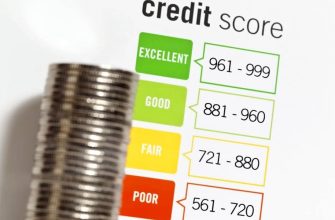Indicators from FICO and VantageScore are not static. They rise or fall depending on changes in reports from three national bureaus. If you notice that your credit score dropped, there are many possible reasons. Discover ten common causes in our guide.
A decrease may affect your borrowing, employment, insurance, and rent. The same assessment is used by companies in different industries. For them, your score is a convenient shortcut, a universal indicator of creditworthiness. A few lost points may move you from the “good” category to “fair”, and from “fair” to “poor”. So, why did your credit score drop?
Reasons Credit Score May Drop
Your status may deteriorate due to a late payment, a change in your limits, new applications, and other events. The factors correspond to the elements of the scoring models. Here are their key components in order of importance. First, consider FICO:
- Payment history — 35%;
- The total amount owed — 30%;
- Length of history — 15%;
- New credit accounts — 10%;
- Types of credit used — 10%.
VantageScore uses a similar breakdown. Here, your prior payments are also the most influential factor defining 40% of the total. Depth of credit comes second with 21% of the influence, followed by utilization (20%), recent credit (5%), and available credit (3%). Knowledge of these systems will help you understand why your credit score went down. Here are the top 10 reasons:

1. You Skipped One or More Payments
The way you handle financial obligations defines over a third of FICO and VantageScore results. Making payments on time is paramount. Missing even one of them may be why the credit score dropped.
Normally, lenders report the event when a payment is over 30 days overdue. Your failure becomes derogatory in your borrowing history. The longer the delay — the more serious the impact. Do not wait until it is too late. If you are only a few days late, correct the mistake and contact the lender. They may agree to give you a pass and not to report the delay.
Whatever the circumstances, do not ignore the lender’s demands. If you are in a difficult situation, explain it — communication is key. When delinquencies are not paid, lenders pass the debts over to collection agencies. In this case, a collection account is bound to appear on your report.
Such negative entries affect your status for 7 years. In contrast, positive events on open accounts stay forever (if the account is closed in good standing, their lifetime is 10 years). As you can see, making payments on time is the most important condition. Forgetfulness may explain why your credit score dropped 100 points.
2. You Recently Applied for Any Form of New Credit
Every new application causes a hard inquiry to appear. These report entries show that your records were retrieved. A high density of inquiries over a short period makes you look like a desperate applicant, someone in urgent need of cash.
Whenever you authorize a lender to check your records, this may cause a sudden drop in credit score. Think twice before sending multiple applications. Check the requirements thoroughly to avoid reapplying. A hard inquiry may have a slight effect for a couple of years.
Naturally, there is nothing wrong with applying for new credit occasionally. It is a high frequency that must be avoided. On the upside, the effects of hard inquiries are relatively modest. Still, they could be the reason your credit score dropped after buying a car.
3. Credit Utilization Has Gone Up
Do you know why maxing out credit cards is a terrible idea? It raises credit utilization to 100%. This is the proportion between your balances and limits. When it rises over 30%, you have a problem. For example, if three cards give you access to $3,000, and you have charged $1,500 this month, the rate is 50% — i.e., you have used half of your available credit.
Experts suggest the optimal level is 10% or less. The less of the limits you spend — the better. The way you utilize revolving credit affects a third of the FICO score. Whenever you have spare cash, use it to bring down the balances. Do not overuse credit cards.
People who cannot afford to pay off their balances can approach the task from a different angle. Another way to lower utilization is to extend the limits. As there will be more available credit, the proportion will tilt in your favor.
So, how can you do this? First, you could ask your bank for a limit extension. If this request is denied, you could try getting a card from another issuer. Secured credit cards are the easiest to get because they require a deposit.
4. A Credit Limit Has Shrunk
Suppose the limit on a credit card you rarely use has been slashed. This is not related to your payments, so why did your credit score go down? Due to higher utilization. Suppose you have $3,000 on three credit cards, with $1,000 of the outstanding balance. The bank decreases the limit to $2,000. Your utilization jumps from 30% to 50%, which is guaranteed to reduce the total.
Limits may be adjusted for different reasons. The bank may reduce them due to changes in your income, debt-to-income ratio, credit history, or score. You may not be using the card much. Maybe you have failed to fulfill your obligations. In such cases, getting an increase is a challenge, so you should consider some alternative fixes.
5. You Closed a Credit Card
Any credit card you have contributes to utilization and your status. Both assessment systems consider the sum of active limits. Therefore, if you close a card, this slashes available credit, boosting utilization and lowering the total. Think twice before doing it.
Another negative consequence is a shorter average credit age. The length of your borrowing records accounts for 15% of FICO. Generally, a longer history is always favorable. On the upside, if the account is closed in good standing, it will remain on the report for up to a decade.
So, should you close an old card or keep it to avoid a credit score decrease? Look at the annual fee to decide. If it is high, or you feel tempted to overspend, closing the account makes sense. Otherwise, keep it open to support a positive total.
6. You Paid Off a Loan
At first glance, this is a positive event and an achievement. However, it may also come with a worse total. Making the final payment closes the account, which is bad for your credit mix. If your credit score dropped after paying off a loan, this is logical. You may only reduce the impact by taking care of other aspects of your borrowing history.
7. Your Credit Report Contains Errors
Does it seem that your credit score dropped for no reason? According to the Federal Trade Commission, every 5th US citizen sees a dip due to reporting errors. These mistakes range from misspellings to false derogatories like evictions or bankruptcies. As most negative events stay on your records for 7 years, these errors may have serious and lasting consequences.
By law, you may collect your own reports once a year for free. Due to the pandemic, it is now possible weekly. Go to www.annualcreditreport.com to download all three files — from Experian, Equifax and TransUnion. Engaging all three bureaus is crucial, as they compile their reports independently.
Even with the biggest fixers like Lexington Law, credit repair is a lengthy process. If there are multiple mistakes, removing them may take 3-6 months. Check your records often to fix them ASAP. You may also discover you have been a victim of identity theft, and fraudsters have taken out loans in your name.
Note that only wrong details can be disputed. You will never fix a hard inquiry or an accurate birth date. The bureau will also require evidence (bank statements and other documents) along with a formal dispute letter. Alternatively, you may delegate fixing to professionals — legal credit repair is a large industry.
8. There Has Been a Foreclosure or Bankruptcy
With time, late payments cause bankruptcies or foreclosures. Both are detrimental to scores. The effects may linger for up to 7 or 10 years (the latter is true for chapter 7 bankruptcy).
By law, you can initiate a legal process to get relief from the payments. No other negative event can be as harmful. Foreclosure, on the other hand, means that your lender takes possession of your house. This is the second worst-case scenario. As a rule, this happens after four consecutive months of non-payment. Both bankruptcies and foreclosures may disqualify you from particular types of borrowing. Lenders will be deterred by either event in your past.
9. Co-Signing a Loan or Application
You may have helped a friend or family member to get credit. Signing on the dotted line does not affect your score, but if the borrower does not make the payments afterward, it will. Get online access to the account to monitor the activity. To avoid the damage, you could make the payments yourself. In any case, talk to the other person first.
10. Unauthorized Use
Fraudsters never stop devising new ways to steal our personal data. Your credit card may have been cloned or stolen. In case of suspicious alerts, call the issuer ASAP. If your account has been used by a third party, you will not be charged. The bank will issue a new credit card. Sometimes, the reasons are less intimidating — like a child using their parent’s card to pay for games.
Conclusion
As you can see, the reasons your credit score goes down can be very different. From higher utilization to bankruptcies, the range is broad. If you understand how FICO and VantageScore work, you can pinpoint the likely culprit. Maybe you have overused your credit cards, sent multiple loan applications, or gone through bankruptcy. Sometimes, a decrease is not your fault. You may discover your credit score dropped 200 points because of reporting errors, so repair is necessary.








